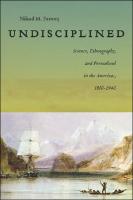Undisciplined
Science, Ethnography, and Personhood in the Americas, 1830-1940
Abstract
In the 19th century, personhood was a term of regulation and discipline in which slaves, criminals, and others, could be “made and unmade." Yet it was precisely the fraught, uncontainable nature of personhood that necessitated its constant legislation, wherein its meaning could be both contested and controlled. Examining scientific and literary narratives, Nihad M. Farooq’s Undisciplined encourages an alternative consideration of personhood, one that emerges from evolutionary and ethnographic discourse. Moving chronologically from 1830 to 1940, Farooq explores the scientific and cultural entanglements of Atlantic travelers in and beyond the Darwin era, and invites us to attend more closely to the consequences of mobility and contact on disciplines and persons. Bringing together an innovative group of readings—from field journals, diaries, letters, and testimonies to novels, stage plays, and audio recordings—Farooq advocates for a reconsideration of science, personhood, and the priority of race for the field of American studies. Whether expressed as narratives of acculturation, or as acts of resistance against the camera, the pen, or the shackle, these stories of the studied subjects of the Atlantic world add a new chapter to debates about personhood and disciplinarity in this era that actively challenged legal, social, and scientific categorizations.
Keywords
Literature: history and criticism; Social and cultural anthropologyDOI
10.18574/nyu/9781479842865.001.0001ISBN
9781479842865, 9781479812684, 9781479842865, 9781479842865Publisher
New York University PressPublication date and place
New York, 2016Imprint
NYU PressSeries
America and the Long 19th Century, 9Classification
Literature: history and criticism
Social and cultural anthropology


 Download
Download Download
Download